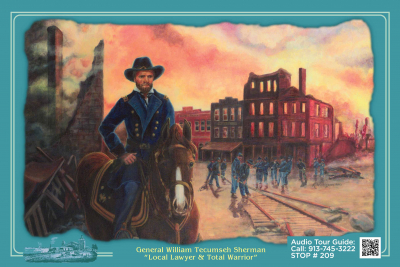Wayside Tour #9: William Tecumseh Sherman - "Local Lawyer and Total Warrior"
Wayside Tour #9: William Tecumseh Sherman - "Local Lawyer and Total Warrior"
The law firm of Sherman, Ewing and McCook was on the 2nd floor of a wooden building located in front of this pedestal. All four partners in the firm became general officers in the Union Army during the Civil War. The most famous member of the firm was William Tecumseh Sherman who led Union forces on the famous "March to the Sea".
Sherman, a West Point graduate, served 13 years in the U.S. Army before resigning his commission to become a banker in California. The bank business failed, and he lost most of his money in paying off the bank's debts. In 1858, at the suggestion of his father-in-law, Sherman came to Leavenworth to join the law firm of his brothers-in-law Thomas and Hugh Ewing. Though not a lawyer, he was to handle the non-legal affairs of the firm, while the brothers-in-law handled the courtroom part of the business.
Sherman decided that since his name was part of a law firm, he should get a license as a lawyer, although he had not studied law. He writes in his memoirs that "one day when United States Judge Lecompte was in our office, I mentioned the matter to him: he told me to go down to the clerk of his court, and he could give me the license. I inquired what examination I would have to submit to, and he replied, 'none at all'; he would admit me on the ground of general intelligence."2
In the summer of 1859, Sherman left Leavenworth to take a job as the head of a new military academy in Louisiana, now known as Louisiana State University. Believing the Civil War to be imminent, Sherman resigned in 1861, to rejoin the United States Army and became one of the most outstanding Union field commanders of the Civil War. His assignments included command of a brigade at the First Battle of Bull Run in July 1861.
Later, at Shiloh he was wounded in the hand on the first day and on the second day had three horses shot from under him, finishing the battle on a fourth. General Grant recommended him for promotion after the battle, writing, "to his individual efforts I am indebted for the success of that battle."
Under Grant, General Sherman commanded the XV (15th) Corps in the Vicksburg Campaign moving down the river in an amphibious campaign that led to Vicksburg's surrender on July 4, 1863.
In March 1864, General Sherman succeeded General Grant as commander in the west. Before leaving for Washington to assume command of all Army Forces, General Grant met with General Sherman and planned a concerted campaign for the rest of 1864. Part of the plan called for General Sherman's armies to advance against General Johnston and Atlanta. General Sherman's goal was to destroy the Confederate armies, and get into the Confederacy's interior to inflict the maximum amount of damage against the enemy's war-making resources.
Sherman advanced relentlessly against Atlanta, maneuvering the Confederates out of their good defensive positions. Atlanta was too strong to be seized in a direct assault; therefore, General Sherman's army began a siege in July eventually circling to the west and cutting the communications and supply link between Atlanta, Montgomery, Alabama, and Macon, Georgia. General Hood abandoned the city on the first of September 1864, and it was occupied by Sherman the next day.
After seizing it, General Sherman destroyed all installations of military value in Atlanta, and breaking all communications and supply links with the outside world began a march to the sea with 62,000 men on the 15th of November.
His goal was to make Georgia howl. His troops were ordered to "forage liberally off the country" and they cut a swatch of destruction twenty miles wide from Atlanta to the sea, destroying all war supplies, public buildings, railroads and factories. General Sherman captured Savannah on December 21, concluding one of the war's more spectacular campaigns.
Three weeks later, Sherman began a march through the Carolinas. Regarded as the "cradle of secession," the Union army burned and pillaged its way through South Carolina to punish its people for starting the war.
After the war and the presidential inauguration of Ulysses S. Grant, General Sherman in 1869, became General of the Army. His interest in military education led him to order the establishment of the School of Application for Infantry and Cavalry (now the Command and General Staff College) at Fort Leavenworth in 1881, so the Army would be able to "keep up with the rapid progress of the science and practice of war."
General Sherman retired in 1883 and died at his home in New York in 1891.



